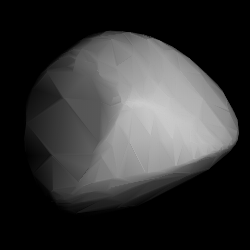227 Philosophia
Appearance
 3D model based on lightcurve data | |
| Discovery | |
|---|---|
| Discovered by | P.P. Henry |
| Discovery date | 12 August 1882 |
| Designations | |
| (227) Philosophia | |
| Pronunciation | /fɪloʊˈsɒfiə/ |
Named after | Philosophy |
| A882 PA, 1919 AA 1933 SD1, 1949 OO1 | |
| Main belt | |
| Orbital characteristics[1] | |
| Epoch 31 July 2016 (JD 2457600.5) | |
| Uncertainty parameter 0 | |
| Observation arc | 108.20 yr (39519 d) |
| Aphelion | 3.7673 AU (563.58 Gm) |
| Perihelion | 2.56007 AU (382.981 Gm) |
| 3.16366 AU (473.277 Gm) | |
| Eccentricity | 0.19079 |
| 5.63 yr (2055.3 d) | |
Average orbital speed | 16.78 km/s |
| 71.2570° | |
| 0° 10m 30.554s / day | |
| Inclination | 9.1539° |
| 326.254° | |
| 267.020° | |
| Physical characteristics | |
| Dimensions | 87.31±2.4 km |
| 52.98 h (2.208 d) | |
| 0.0768±0.004 | |
| 9.1 | |
Philosophia (minor planet designation: 227 Philosophia) is a large main-belt asteroid that was discovered by the French astronomer Paul-Pierre Henry on August 12, 1882, in Paris and named after the topic of philosophy. Based upon photometric observations, it has a synodic rotation period of 52.98 ± 0.01 with a brightness variation of 0.15 ± 0.02 in magnitude.[2]
References
- ^ Yeomans, Donald K., "227 Philosophia", JPL Small-Body Database Browser, NASA Jet Propulsion Laboratory, archived from the original on 1 September 2014, retrieved 12 May 2016.
- ^ Pilcher, Frederick; Alkema, Michael S. (July 2014), "Rotation Period Determination for 227 Philosophia", The Minor Planet Bulletin, 41 (3): 188–189, Bibcode:2014MPBu...41..188P.
External links
- The Asteroid Orbital Elements Database
- Minor Planet Discovery Circumstances
- 227 Philosophia at AstDyS-2, Asteroids—Dynamic Site
- 227 Philosophia at the JPL Small-Body Database
